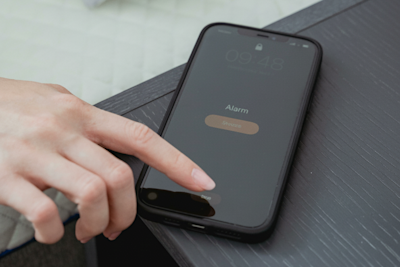
How to Reclaim Control in the Attention Economy
Attention Economy & Getting Lost in the Scroll
We like to think we’re getting smarter. After all, we have endless information at our fingertips, powerful tools in our pockets, and instant access to anything we want to learn or watch. However, as strange as it may seem, the data tells a different story.
A study from Northwestern University shows that performance in three key areas of intelligence, verbal reasoning, matrix reasoning, and number/letter series, has been declining in recent years. It’s part of a broader phenomenon known as the Reverse Flynn Effect, where IQ scores, which had been rising steadily throughout the 20th century, are now going in the opposite direction. [1][2]
While experts are still debating the exact causes, many point to changes in our environment, particularly look at how we interact with technology.
We live in an era of endless information. Our days are increasingly filled with distractions, constant pings, and digital demands on our attention. And the more fragmented our focus becomes, the harder it is to think deeply, remember clearly, or solve problems effectively.
The Attention Economy and Its Hidden Cost
The last two decades gave rise to platforms that transformed how we interact with the world. Facebook, YouTube, Instagram, TikTok, each new social media platform is optimized more than the last one to hold our attention for as long as possible. The longer we scroll, the more ads we see. That’s the business model.
However, it’s not just about selling ads. What’s truly being traded is our attention, our ability to focus, think deeply, and engage meaningfully with the world. This limited resource is now mined, tracked, and sold in exchange for clicks, views, and time on screen.
Behind every app is a team of engineers, designers, and behavioral scientists working to make it harder for you to look away. Every notification, infinite scroll, or auto-play feature is engineered to keep you hooked.
And it’s working. But at what cost?
Attention as Currency Is The New Reality
Scholars are now arguing that we’re not just spending time, we’re spending attention like a currency. In fact, recent research suggests that attention has become a universal symbolic currency, with social media platforms acting as the central banks of this new economy. [3]
The more attention something gets, the more valuable it becomes. But here’s the thing, our biological ability to focus is finite. Once spent, it cannot be stored, saved, or reclaimed. In this system, we’re constantly being nudged, distracted, and drained by devices designed to capture every sliver of our awareness.
This is why mindful technology is emerging as the antidote. Tools like Mudita Kompakt are designed not to compete in the attention economy, but to protect you from it. Built with simplicity at its core, Mudita Kompakt helps users reduce screen time, stay present, and reclaim their cognitive space. With no algorithm fighting for your focus and no social media trying to monetize your mind, it's a phone that puts your well-being, not your screen time, first.
At Mudita, we’d like to think our E Ink phone is more than just a minimalist device, Mudita Kompakt emphasizes mindful use of technology, aiming to reduce digital overload and improve overall well-being. It features a clean, custom operating system, MuditaOS K, that safeguards your data and privacy while helping you cultivate a healthier relationship with technology.
It reflects Mudita’s philosophy of simplicity and intention, designed for those who want to reclaim their time and focus and prioritize meaningful, real-world experiences.
Mindful Tech as an Antidote
The truth is, what tends to capture our attention isn’t always what benefits us. We’re drawn to outrage, gossip, and empty entertainment. And over time, we pay a steep price. Mental fatigue. Reduced focus. Lost time. A growing sense that we’re living on autopilot.
If we had to be completely honest, we know the attention economy isn’t going anywhere. However, at Mudita, we’ve noticed a growing shift is happening. Some may refer to it as a quiet revolution, or more of an awakening. An ever-growing number of people are questioning the role technology plays in their lives. They’re seeking tools that support their well-being instead of eroding it. They’re asking: What am I really giving my attention to? And is it worth it?
Mindful tech helps answer that question by making space for intentionality.
The Bigger Picture
Yes, the infinite scroll is real and algorithmic distraction is a serious issue. That’s why protecting your attention is no longer optional, but rather essential. Like we mentioned earlier, the attention economy isn’t going away. However, we can choose how we respond to it.
Choosing mindful tools, questioning our digital habits, and rethinking the role of technology in our lives is how we start to reclaim control.
Because once we begin to value our attention as the precious currency it is, we’re far less likely to give it away for free.
We’d love to hear your thoughts. If this article resonated with you, feel free to share it with someone who might need a reminder that their attention is worth protecting.
Related stories

Why Smartphone Alarms May Be Ruining Your Sleep
Find out why smartphone alarms may harm your sleep and explore healthier alternatives like mindful alarm clocks, sunrise lights, and gentle sounds.

Why Boredom Is Good for Your Creativity & Mental Health
Boredom isn’t the enemy. It’s a path to creativity, meaning, and better mental health. Learn why unplugging from your phone can unlock a more fulfilling life.

Why Sleep is the Foundation of Every Good Habit
Quality sleep is the foundation of every good habit. Discover how better rest helps you regain focus, energy, and routine after summer.
If you'd like to receive the best stories from our blog, keep up to date with our progress and get notified about our product releases and special discounts.